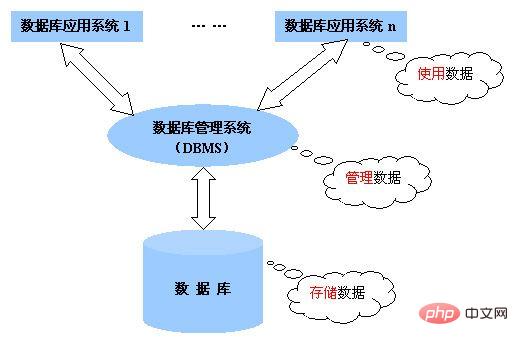What are the main functions of a database management system?
The main functions of the database management system are: 1. Data definition; 2. Data operation; 3. Database operation and management; 4. Data organization, storage and management; 5. Database protection; 6. Database maintain.

The operating environment of this tutorial: windows7 system, mysql8 version, Dell G3 computer.
The main functions of the database management system are as follows:
1. Data definition. DBMS provides data definition language DDL for users to define the three-level schema structure, two-level image, integrity constraints, confidentiality restrictions and other constraints of the database.
2. Data operation. DBMS provides data operation language DML for users to perform operations such as appending, deleting, updating, and querying data.

#3. Database operation management. The operation management function of the database is the operation control and management function of the DBMS, including concurrency control in a multi-user environment, security check and access restriction control, integrity check and execution, organization and management of operation logs, transaction management and automatic recovery .
4. Data organization, storage and management. DBMS needs to classify, store and manage various data, including data dictionary, user data, access paths, etc. It needs to determine what file structure and access method to organize these data at the storage level.
5. Database protection. The data in the database is a strategic resource in the information society, so data protection is crucial.
6. Database maintenance. This part includes functions such as database data loading, conversion, dumping, database reorganization and reconstruction, and performance monitoring.
Related recommendations: "mysql tutorial"
The above is the detailed content of What are the main functions of a database management system?. For more information, please follow other related articles on the PHP Chinese website!

Hot AI Tools

Undresser.AI Undress
AI-powered app for creating realistic nude photos

AI Clothes Remover
Online AI tool for removing clothes from photos.

Undress AI Tool
Undress images for free

Clothoff.io
AI clothes remover

AI Hentai Generator
Generate AI Hentai for free.

Hot Article

Hot Tools

Notepad++7.3.1
Easy-to-use and free code editor

SublimeText3 Chinese version
Chinese version, very easy to use

Zend Studio 13.0.1
Powerful PHP integrated development environment

Dreamweaver CS6
Visual web development tools

SublimeText3 Mac version
God-level code editing software (SublimeText3)

Hot Topics
 1386
1386
 52
52
 Core differences between Sybase and Oracle database management systems
Mar 08, 2024 pm 05:54 PM
Core differences between Sybase and Oracle database management systems
Mar 08, 2024 pm 05:54 PM
The core differences between Sybase and Oracle database management systems require specific code examples. Database management systems play a vital role in the field of modern information technology. As two well-known relational database management systems, Sybase and Oracle occupy an important position in the database field. important position. Although they are both relational database management systems, there are some core differences in practical applications. This article will compare Sybase and Oracle from multiple perspectives, including architecture, syntax, performance, etc.
 What software is database management system?
Jul 18, 2022 pm 01:42 PM
What software is database management system?
Jul 18, 2022 pm 01:42 PM
Database management system is a large-scale software that manipulates and manages databases, referred to as DBMS, and is used to establish, use and maintain databases. The database management system is a data operation software that can provide data entry, modification, and query. It has functions such as data definition, data operation, data storage and management, data maintenance, and communication, and can be used by multiple users. Users access data in the database through DBMS, and database administrators also perform database maintenance through DBMS.
 What is the relationship between database, database system and database management system?
Jan 11, 2021 pm 06:20 PM
What is the relationship between database, database system and database management system?
Jan 11, 2021 pm 06:20 PM
The relationship between database, database system and database management system is: database system includes database and database management system. A database system is a computer system with a database, which generally consists of a database, a database management system (and its development tools), related hardware, software and various personnel.
 What is a database management system?
Dec 28, 2020 pm 01:40 PM
What is a database management system?
Dec 28, 2020 pm 01:40 PM
Database management system is a large-scale software that manipulates and manages databases and is used to establish, use and maintain databases; it provides unified management and control of databases to ensure the security and integrity of the databases.
 What is the core of a database system?
Sep 27, 2021 pm 02:24 PM
What is the core of a database system?
Sep 27, 2021 pm 02:24 PM
The core of the database system is the database management system (DBMS), which is system software that works with the support of the operating system and solves how to organize and store data scientifically, and how to obtain and maintain data efficiently; DBMS can perform unified management and management of the database. controls to ensure the security and integrity of the database.
 What is a database management system
Aug 17, 2023 pm 02:23 PM
What is a database management system
Aug 17, 2023 pm 02:23 PM
A database management system is a software system used to manage and organize data. It allows users to create, access, update and manage data in the database. Database management systems provide a structured way to store and retrieve data so that users can easily access and manipulate data. Database management systems have many advantages, including efficient data management, flexible query capabilities, and the ability to share data. Different Types of database management systems are suitable for different application scenarios and data models.
 What is the structure of most database management systems currently used?
Aug 24, 2022 pm 02:15 PM
What is the structure of most database management systems currently used?
Aug 24, 2022 pm 02:15 PM
The structure of database management systems is mostly "relational structure". The relationship structure is an unformatted structure that uses a single two-dimensional table structure to represent entities and the relationships between entities. The relational structure organizes data in the form of record groups or data tables to facilitate storage and transformation using the relationships between various entities and attributes. It does not have hierarchies or pointers. It is a way to establish the relationship between spatial data and attribute data. Very efficient way to organize data.
 What kind of software does database management system belong to?
Dec 10, 2020 am 10:28 AM
What kind of software does database management system belong to?
Dec 10, 2020 am 10:28 AM
Database management systems belong to "system software". System software includes the operating system and a series of basic tools (such as compilers, database management, memory formatting, file system management, user authentication, driver management, network connections, etc.), which supports the normal operation of the computer system and realizes That part of the software that the user operates.




